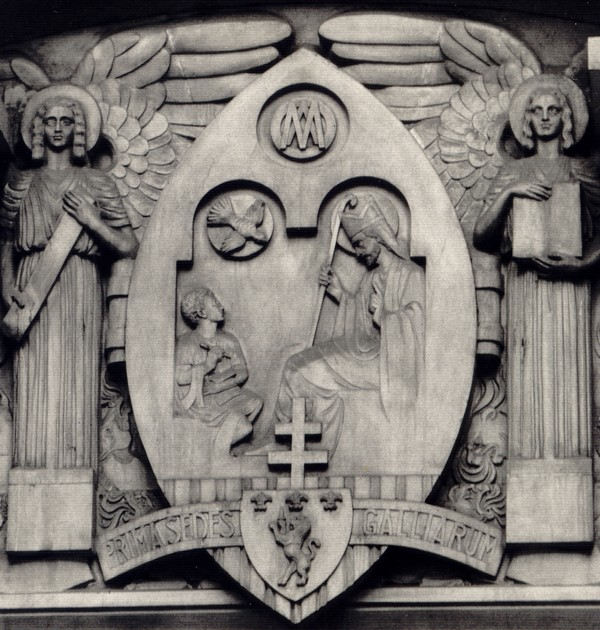The Association of Founders and Protectors of the Catholic Institute of Lyon
The Catholic Faculties of Lyon were founded under the high authority of the Bishops of the South-East region, who retain direction of the university with the title of Protector, and whose 23 dioceses form the university region.

Emblem Representing the Transmission of Knowledge
The Catholic faculties are administered within the framework of an association called the "Association of Founders and Protectors of the Catholic Institute of Lyon'' (AFPICL), which is an association (under the law of 1901), and is recognized as a public service by the law n°129 of April 17, 1942.
The Archbishop of Lyon, Primate of the Gauls, is by right the Chancellor of the University and presides, in the name of the Holy See, over the government of this university.
Composition of the Board of Governors:
The AFPICL Board of Directors is made up of a President, two Vice-Presidents, a Treasurer and 14 directors.
This administrative and financial role, performed entirely on a voluntary basis, is vital as it provides the Rector of UCLy and his team with the means to carry out the university’s work.
- President: François CHANIOT
- Vice-Presidents: Archbishop of Lyon Olivier de GERMAY, Maître Jean-Philippe DELSOL
- Treasurer: Marc HENRY
- 14 directors
The AFPICL operates with a tight budget. It receives enrolment fees from students’ families, government grants, apprenticeship tax contributions from companies and donations.
It pays the university’s employees - researchers, lecturers, administrative and technical staff and finances investments such as the Research Center, new courses and teaching and learning projects, not forgetting of course recurring investments such as the modernisation of laboratories, infrastructure and IT systems (ERP software, intranet), etc.
The dynamism of UCLy’s vocational schools, departments and institutes requires significant investments in course design and teaching and learning resources. The partner companies who choose to direct their apprenticeship tax to one of our bodies year after year are showing their support for our teaching work and supporting the development of learning. The partner companies, often also patrons, work with us and take part in the meetings of our decision-making bodies. We are keen to cultivate this proximity to the business world as our mission is to train talents who will go on to work in these companies.
The AFPICL enables UCLy to continue to make progress with you while keeping its development sustainable and increasingly well-managed, for example:
- Through balanced financial management, allowing it to continue to exist and pursue its major projects,
- With a number of students that allows it to maintain its operation and its influence, while remaining a high level university with a personal touch.
The Role of the UCLy Chancellor
The UCLy Chancellor is the Archbishop of Lyon : Olivier de GERMAY
The Chancellor represents the Catholic University at the Holy See. He is the ordinary prelate on whom UCLy depends canonically. His main mission is to ensure that the Catholic faith is at the heart of the university’s thinking and of university life.
His role also involves:
- moving the Catholic University forward in unity and harmony, ensuring that the Church’s doctrine is retained in its entirety and ensuring the application of the Statutes and the orders from the Holy See
- have the Rector named by the committee of the AFPICL approved by the Dicastery for Culture and Education, receive their profession of faith and request the nihil obstat for the permanent teaching staff at the ecclesiastical departments who are promoted to the position of ‘professor’
- inform the Dicastery for Culture and Education about important matters and send them a detailed report on the university’s academic, spiritual and financial situation every three years.

